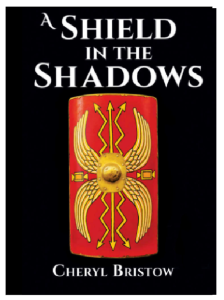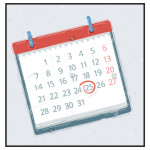
Cheryl Bristow is a Canadian author, living and writing in southern Ontario. She published her opus, A Shield in the Shadows, in 2015. Her book has been highly acclaimed, winning numerous prizes but the highest awards have eluded her, probably because her work is such a unique, niche one. [ See more commentary after the interview ]
- What inspired you to set your romance novel in Roman times rather than any other setting?
This answer is going to surprise you. I am a committed Christian and clergy wife—my husband is an Anglican minister, but I have my own strong faith stemming from a dramatic childhood conversion. For many years I led Bible studies, helped with the editing, writing and copywriting for an evangelical Anglican group based out of Montreal, and got involved in the worldwide Alpha program when we were based in Markham, Ontario. After our fourth Alpha program, suddenly I was no longer needed. The others who had come up through the Alpha program needed to take over leadership positions. I understood that, but still it felt like I had outlived my usefulness.
I went to a church that had a prophet training program and signed in. When I was called forward, the five young people would not allow me to say what my ‘need’ was, or direct them in any way, and I had never met one of them in my life. Several of them came from overseas, a few were Canadian. One after the other they told me what they were hearing the Lord say to me, and I still have the tape. The Lord showed one of them that I was alone in a room full of books, and then the doors opened and crowds of people came in to get the books. He had more information to give me later. The room was buried below ground and God was telling me to get all that wisdom, imagination and intellect out there. Another girl said she saw me standing on a railroad platform wearing Victorian clothing and carrying a carpet bag. She heard a loud blast in her ear and saw the train coming into the station, and then I boarded it. She asked me if I had an interest in history, and I could answer that I did.
There was more, but I left with much to mull over. I played that tape over and over to build up my confidence, and then bought a book at the Tyndale University book store on The Story of Christianity. I had not gotten too far into it when I reached the section about the barbarian tribesmen crossing the Rhine River and devastating Gaul. It took me back to the fear I felt when my high school history teacher read an account of that to our class. I decided that I would start with that.
- There must have been inherent and serious problems in writing your novel in its particular time period. How did you overcome them? Did you anticipate them before you began the novel?
Yes, I knew almost nothing about what I planned to write on. I remembered a little bit about the rooms in a Roman house, but I did not know anything about the Emperors in charge of the Empire, the names of the tribes involved, why they came, where they crossed and what happened next.
I spent eight years studying to find out, and hundreds of dollars on books. I had to learn so much. As a novelist you are not focusing on one issue only. You have to enter the mindset of that period of time and ignore the years and centuries that followed. I had to learn which tribes were involved, what the Roman Empire was like in this particular period, how the Army worked, the names of Roman towns and roads, what it was like to be a woman, what foods people atw, how they dressed, who was alive at the time that we might recognize today, what the church was like, and much more.
The Roman Empire lasted for almost 1200 years, and of course much about it evolved. I read so many university texts, many of them very specialized, that I became familiar with the history to the point where I knew I was ready to start to write. But the more I read, the more I realized that although the crossing of the Rhine by those barbarian tribes was important, it was not the main story. The core story was happening in Italy and north of the Danube, so reluctantly I shifted my attention.
- Describe your process for character creation and development.
In 2011, I took a short course at our local book store on novel writing. The instructor told us we had to have a story outline and the first chapter written by the end of the course. I panicked, because I did not know who my main characters were yet. I sat down with a piece of 8 ½ x 14” paper and began writing down the names of all the people I had learned about who were alive and part of the historical record for 406 AD and then drew a line connecting them all. The one name that showed the most lines leading to it was Princess Galla Placidia, the daughter of the then late Emperor Theodosius the Great. She would thus become the deciding factor for the timeline.
My writing instructor suggested that I should include protagonists from both sides of the conflict, so I needed to get the barbarian perspective as well as the Roman perspective into the novel. That meant that I had to get a barbarian girl into some kind of contact with Galla Placidia. That brought into focus the massive invasion of Gothic king Radagaisus that happened in 405 and 406.
One interesting detail about this pagan gothic warlord is that St. Augustine of Hippo reported him to be fiercely anti-Christian. He was angry that Theodosius the Great had made Christianity the official religion in the Roman Empire (this was decades after Constantine the Great), and his private motivation was to punish the Roman Senate for removing the statues of their traditional gods from the Curia in Rome. For that he was going to crucify them and burn the city of Rome to the ground. Yet St. Jerome reported that there were Christians travelling with him. I asked myself, why would they do that, and set out to find the answer, which you will see in the first chapter of the book.
- What was the reception for your novel by your publisher? Your readers?
My book is self-published. I guess the main reason is because of my age. I was 69 by the time I finished the novel and did not want to wait several years for someone to agree to publish my book. I did try about twenty traditional publishers, but the process for being selected is difficult if you are not already well known. Often a university student is employed to read your description of your book, and they are given guidelines such as ‘we are only interested in dystopian stories aimed at a younger audience’, or ‘look for detective stories with a twist’. My book would have been quickly deleted. At that time, though, the whole publishing industry was in crisis as fewer and fewer people were buying books, and those that were willing to take a chance on a new author (most won’t) want those authors to work hard to promote their books. This I was unwilling to do. Having signed up for such a complicated assignment, I thought I would just leave the issue of promotion to God. After all, I reasoned, this was His idea in the first place. However, those readers who have read the book usually love it. I have many people tell me that they wish it could be made into a movie. Several readers have told me they were sorry when they got to the end of it. Others have read it multiple times. One woman I know has read it eight times! That boggles my mind.
The other reason I have not invested a lot of time in promoting my book is because there are supposed to be several follow-up books in the series. I have not done much along that line yet because in the interim since the first version came out, I have had to shorten it, then we moved to a different city and that took a year to process.
- How well-received was your book given its historical setting which some may view as being unusual, maybe surprising?
In 2016 I attended a writer’s conference in Toronto and met an agent who told me that he knew for a fact that I was the only writer in North America who was writing about that period of history.
The original version of A Shield in the Shadows, which is an epic novel, came out in 2015 and was a finalist in the Word Guild Awards in 2016. My daughter had entered it into an international competition that same year and she received a medal and a cheque that summer which was intended for me as A Shield in the Shadows had tied for first place in the Next Generation Indie Book Awards in the Christian fiction category. That news was a godsend as I had had a bad accident on the 401 a month earlier and was suffering from anxiety attacks.
The second, shorter version of the book came out last July. I entered it into several international and national book competitions and learned after Christmas that A Shield in the Shadows was one of two finalists (not the winner) in The Beverly Hills Book Awards in its category. That was exciting because that particular completion is open to books from any source, traditional publishers, university press and self-published books.
- Have comparisons been drawn to Romeo and Juliet? Would you be opposed to such comparisons?
No one has made such a comparison yet. I would not be opposed, but I am not sure it is appropriate. I would be interested in what you have to say after you finish reading it.
- What was the most difficult aspect to completing your novel?
I actually love studying and research. The writing is not particularly hard for me either, but I had to do my own editing, publishing and promoting. I did not have to learn just about the events I would be writing about, but everything else too. When I would be tempted to feel sorry for myself, I just sucked it up and read another book! I think the hardest long-term job was editing for punctuation. In the beginning I did not use enough commas, then I used too many, and then I had to learn the correct, albeit subjective use of them.
- How did your editors find the historical setting as they edited your book? Was it more challenging to edit as compared to editing a novel set in modern times?
I paid for an analysis from a team of editors in Fergus, but it was a general appraisal looking for constructive advice. They loved the novel, thought it was superb in fact, which encouraged me greatly at the time, but I had to do my own editing as I am retired and receive just government pensions and a small RIF.
As my own editor, I missed a couple of things in the first version that I fixed in the second one. I don’t think there are many historical mistakes in the book—I checked everything from white flags, locks, horse varieties, hair styles and geography quirks to tribal burial practices and the history of the Huns, but I still made a couple of mistakes in the first version which I tried to fix in the second.
- *** Amazon reviews state the author as L.A. Racines…why do you use a pen name?
The first book was written under the name L.A. Racines, which is French for Wings and Roots. I thought the name was clever and meaningful, but no one else got it! I used my own name the second time around because everyone I knew told me I should, and by then I had realized that Bristow would be placed higher up on library shelves than Racines!
10. How did you deal with publisher rejections? Were there many to overcome?
Answered above.
- How long did it take to write the novel, start to finish? Did you ever feel it would become impossible to finish? What kept you going?
I started to read The Story of Christianity by Justo L. Gonzalez in January 2004. The revised version of A Shield in the Shadows came out in July, 2019.
- Describe the promotion of your book. Has it been an exciting or discouraging process?
Mostly discouraging. There are a million books published every year now, and mine gets lost in the confusion. I am extremely proud, though, that I have written this book. It is above and beyond what I ever could have expected to do, and I am so grateful when someone buys it as a favour to me and then tells me, sometimes years later, that they have finally read it and absolutely loved it.
Read Richard’s review: A Shield in the Shadows





